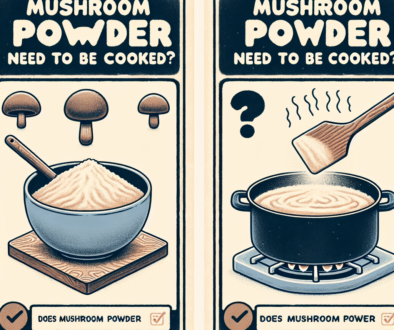Does Maitake Mushroom Interact With Medications?
-
Table of Contents
- Maitake Mushroom Interactions with Medications: Insights and Precautions
- Understanding Maitake Mushrooms
- Potential Interactions with Blood Sugar-Lowering Medications
- Interactions with Blood Pressure Medications
- Effects on Immunosuppressive Drugs
- Considerations with Chemotherapy and Radiation Therapy
- Guidelines for Safe Use of Maitake Mushrooms with Medications
- Conclusion: Balancing Benefits and Risks
- Discover ETChem’s Protein Products
Maitake Mushroom Interactions with Medications: Insights and Precautions

Maitake mushrooms, known scientifically as Grifola frondosa, have been a staple in traditional Eastern medicine for centuries. With their growing popularity in Western cultures, these mushrooms are not only sought after for their culinary uses but also for their potential health benefits. However, as with any natural supplement, it is crucial to understand how maitake mushrooms might interact with medications. This article delves into the research surrounding maitake mushrooms and their potential effects when taken alongside various drugs.
Understanding Maitake Mushrooms
Maitake mushrooms are rich in polysaccharides, specifically beta-glucans, which are believed to support immune function and overall health. They have been studied for their potential to lower blood sugar levels, improve cholesterol profiles, and even exhibit anti-cancer properties. Despite these benefits, the question arises: can maitake mushrooms affect the efficacy or safety of prescription medications?
Potential Interactions with Blood Sugar-Lowering Medications
One of the most significant areas of concern is the interaction between maitake mushrooms and blood sugar-lowering medications. Maitake has been shown to have hypoglycemic effects, which could potentially enhance the blood sugar-lowering capabilities of drugs such as insulin, metformin, and sulfonylureas. This synergistic effect might lead to hypoglycemia, a condition characterized by abnormally low blood sugar levels.
- Insulin: Maitake may increase insulin sensitivity, potentially requiring adjustments in insulin dosage.
- Metformin: As maitake can also lower blood sugar, concurrent use with metformin might necessitate monitoring and dosage changes.
- Sulfonylureas: These medications stimulate the pancreas to produce more insulin, and maitake’s additive effect could heighten the risk of hypoglycemia.
Interactions with Blood Pressure Medications
Maitake mushrooms may also affect blood pressure. Some studies suggest that maitake can lower blood pressure, which could be problematic when taken with antihypertensive drugs. The combined effect might result in blood pressure dropping too low, a condition known as hypotension.
- ACE inhibitors: These medications help relax blood vessels, and maitake might enhance this effect.
- Beta-blockers: Used to reduce blood pressure, the addition of maitake could lead to an excessive drop in blood pressure.
- Calcium channel blockers: Maitake may add to the blood pressure-lowering effects of these drugs, increasing the risk of hypotension.
Effects on Immunosuppressive Drugs
Given maitake’s potential immune-boosting properties, there is a theoretical concern that it could interfere with immunosuppressive medications. These drugs are often prescribed to prevent organ transplant rejection or to treat autoimmune diseases. The immune-stimulating effects of maitake could counteract the intended immunosuppressive actions of these medications.
- Corticosteroids: Maitake may reduce the immunosuppressive effects of corticosteroids.
- Cyclosporine: This drug prevents organ rejection, and maitake’s immune-boosting properties could potentially interfere with its effectiveness.
- Methotrexate: Used for autoimmune diseases, maitake might alter the drug’s desired immunosuppressive outcomes.
Considerations with Chemotherapy and Radiation Therapy
There is ongoing research into the effects of maitake on cancer and its treatment. While some studies suggest that maitake may have anti-cancer properties and could potentially enhance the effectiveness of chemotherapy and radiation therapy, others raise concerns about possible interactions. It is essential for patients undergoing cancer treatment to consult their healthcare provider before adding maitake to their regimen.
Guidelines for Safe Use of Maitake Mushrooms with Medications
To minimize the risk of adverse interactions between maitake mushrooms and medications, the following guidelines should be considered:
- Consult a healthcare provider before starting maitake supplements, especially if you are on medication.
- Monitor blood sugar and blood pressure levels closely if you are taking medications for diabetes or hypertension.
- Be cautious with maitake if you are on immunosuppressive therapy, and discuss any changes with your doctor.
- For those undergoing cancer treatment, only use maitake under the guidance of an oncologist.
Conclusion: Balancing Benefits and Risks
Maitake mushrooms offer a range of potential health benefits, but they must be used with caution, particularly when combined with certain medications. The interactions with blood sugar-lowering drugs, blood pressure medications, immunosuppressants, and cancer treatments highlight the need for careful consideration and professional guidance. By understanding these interactions and taking appropriate precautions, individuals can safely incorporate maitake mushrooms into their health regimen.
Discover ETChem’s Protein Products
For those interested in enhancing their health and wellness through supplements, ETChem’s protein products are worth exploring. ETChem offers a variety of high-quality collagen products that can complement a balanced diet and support overall health.
About ETChem:
ETChem, a reputable Chinese Collagen factory manufacturer and supplier, is renowned for producing, stocking, exporting, and delivering the highest quality collagens. They include marine collagen, fish collagen, bovine collagen, chicken collagen, type I collagen, type II collagen and type III collagen etc. Their offerings, characterized by a neutral taste, instant solubility attributes, cater to a diverse range of industries. They serve nutraceutical, pharmaceutical, cosmeceutical, veterinary, as well as food and beverage finished product distributors, traders, and manufacturers across Europe, USA, Canada, Australia, Thailand, Japan, Korea, Brazil, and Chile, among others.
ETChem specialization includes exporting and delivering tailor-made collagen powder and finished collagen nutritional supplements. Their extensive product range covers sectors like Food and Beverage, Sports Nutrition, Weight Management, Dietary Supplements, Health and Wellness Products, ensuring comprehensive solutions to meet all your protein needs.
As a trusted company by leading global food and beverage brands and Fortune 500 companies, ETChem reinforces China’s reputation in the global arena. For more information or to sample their products, please contact them and email karen(at)et-chem.com today.




